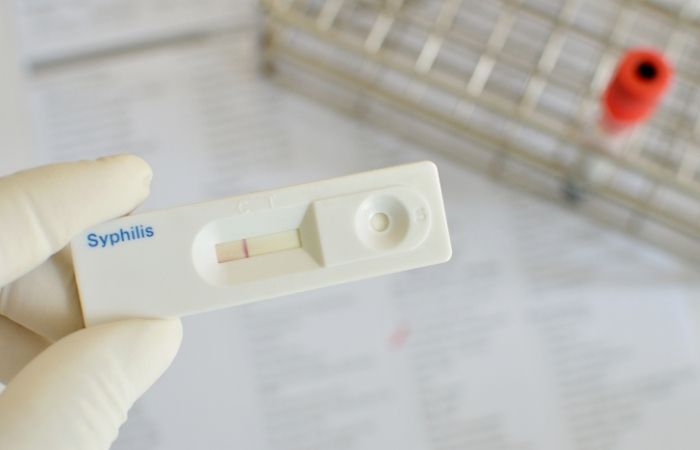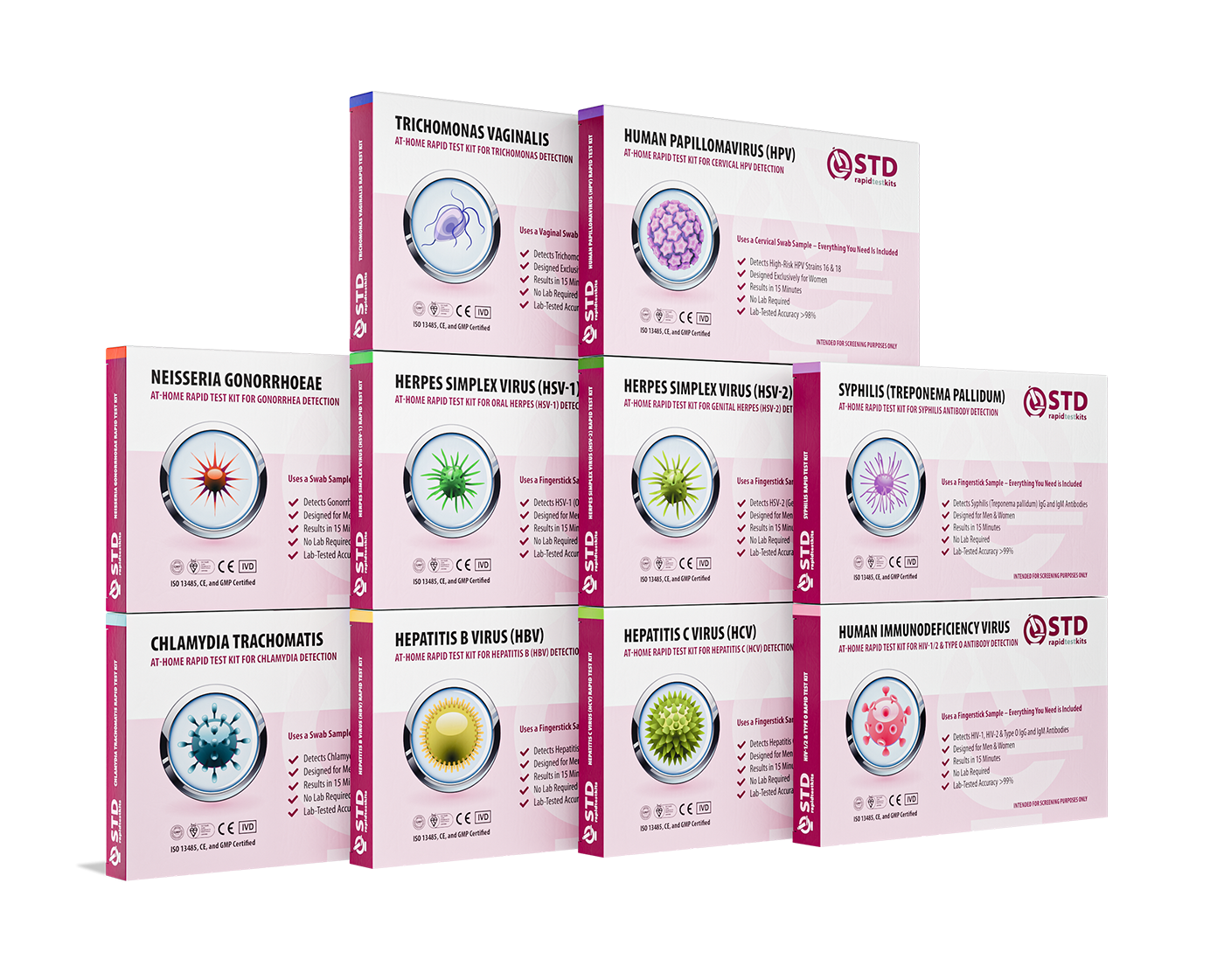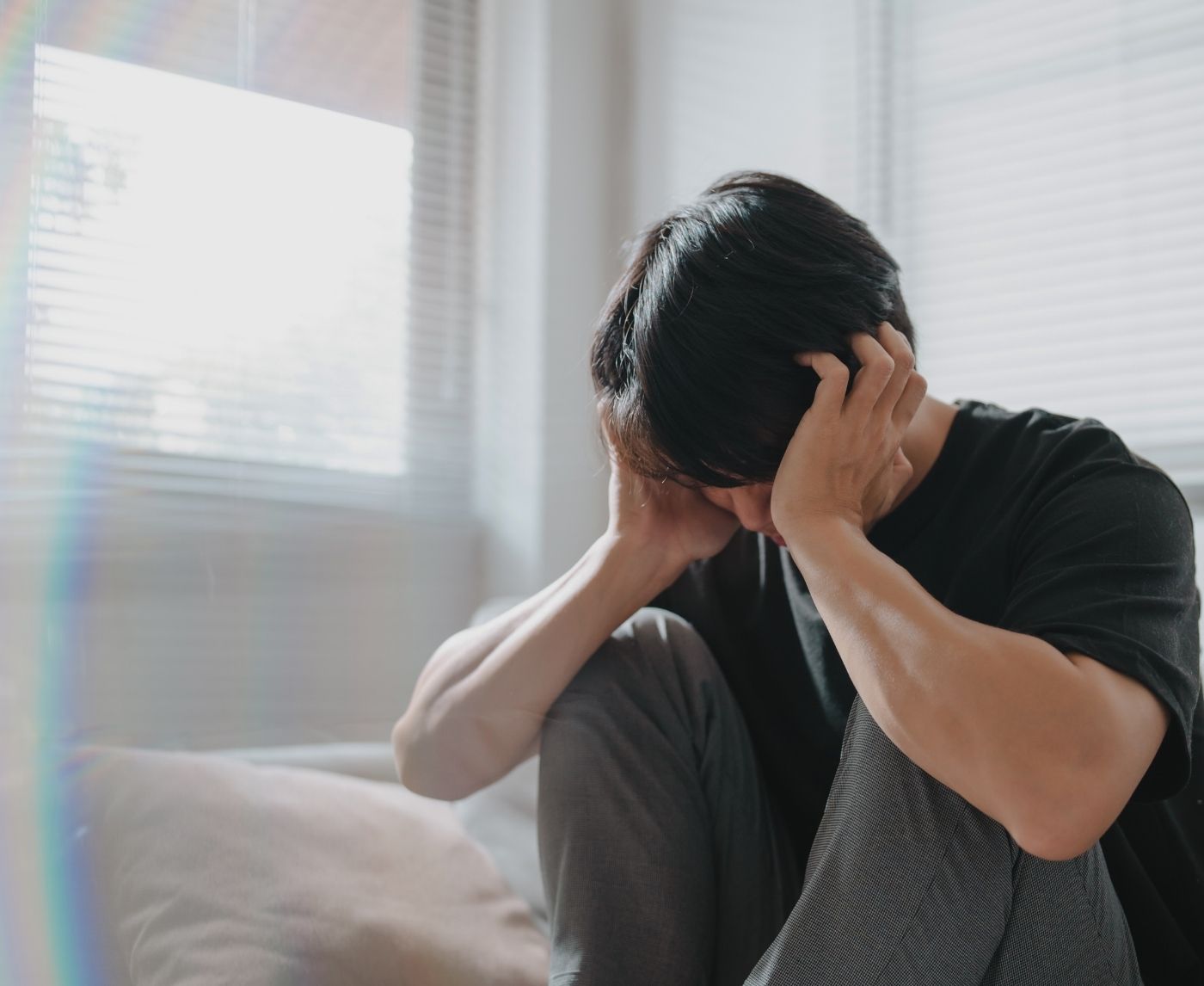Quick Answer: STD anxiety can persist even after a negative result due to health anxiety, trauma, misinformation, or past sexual shame. It’s real and manageable.
This Isn’t Just “Overthinking”; It’s Survival Mode
Jess, 27, had been in therapy for general anxiety when an unprotected hookup triggered something she couldn’t control. “I tested negative twice. But I still felt contaminated. I wasn’t sleeping. I convinced myself they missed something.”
“I kept feeling things that weren’t there. Like tingles, phantom itches. I lost ten pounds from the stress.”
What Jess went through isn’t rare. STD-related health anxiety lives in the same brain circuits as contamination OCD, trauma responses, and body-focused anxiety disorders. According to a 2021 study published in Sexual Health, nearly 1 in 5 people who test negative for STIs still experience symptoms of anxiety, panic, or obsessive checking behaviors for weeks or even months.
This isn’t about being irrational. It’s about your brain trying to protect you, just in overdrive.

People are also reading: Can You Get an STD Even with a Condom?
The Vicious Loop: Test, Doubt, Spiral, Repeat
The typical STD anxiety cycle looks like this:
- Exposure: A risky or ambiguous sexual encounter (e.g., condom broke, no barrier during oral)
- Fear: Immediate panic, usually centered on HIV, Herpes, or “incurable” STDs
- Testing: Repeated, often unnecessary testing for reassurance
- Doubt: Disbelief in negative results (“what if it was too early?”)
- Spiral: Endless online searching, body-checking, symptom obsession
This loop is reinforced by shame-heavy sex ed, horror stories on forums, and even some doctors who dismiss these fears without offering real reassurance.
Many people silently suffer through this alone, especially those in queer communities, survivors of sexual trauma, or those raised with strict or sex-negative upbringings. In these cases, the fear isn’t just of infection, it’s of being judged, punished, or “dirty.”
What You Feel Is Real (Even If It’s Not an STD)
It’s critical to understand that the physical symptoms of STD anxiety can mimic actual infections. This includes:
- Tingling or itching: Often triggered by anxiety, not infection
- Dry skin or red spots: From over-washing or friction
- Digestive issues: Nausea and diarrhea are common in panic states
- Low libido or sexual numbness: Stress can shut everything down
A peer-reviewed study from the Journal of Anxiety Disorders confirms that high anxiety around sexual health often leads to more false-positive symptom perception, meaning, your brain makes you feel something’s wrong, even when nothing is clinically present.
That doesn’t mean you’re faking. It means your nervous system is overwhelmed. And it needs care, not more fear.
The Google Spiral: When Answers Make It Worse
Search engines are a lifeline, but they’re also a trap. When you Google “STD bump or pimple” at 2:17AM, what you're really doing is seeking certainty in a space that profits off fear. Many STD-related articles are designed to trigger clicks, not calm.
Reddit threads, outdated forums, and even some medical sites can leave you convinced you have every STD known to science, especially if you're already in a panic spiral. It’s called cyberchondria: the anxiety-driven belief that your symptoms are more serious than they are because of what you’ve read online.
“I found a post that said herpes could show up as a paper cut. I started checking myself every hour with a mirror and a flashlight,” says Marcus, 33. “Even though I’d tested negative. Twice.”
This kind of checking behavior can become compulsive. And in many cases, it can retraumatize people who already have a history of sexual shame, anxiety disorders, or medical PTSD.
Check Your STD Status in Minutes
Test at Home with Remedium7-in-1 STD Test Kit

 For Men & Women
For Men & Women Results in Minutes
Results in Minutes No Lab Needed
No Lab Needed Private & Discreet
Private & DiscreetOrder Now $129.00 $343.00
For all 7 tests
Why This Hits Harder for Some People
STD anxiety doesn’t hit everyone the same. If you’re queer, non-monogamous, Black, trans, neurodivergent, or a trauma survivor, your risk of spiraling is higher, not because you’re more anxious, but because you’ve been conditioned to feel more guilt and less safety around sex.
Studies show that sexual minorities are more likely to report psychological distress after real or perceived STD exposure, even when no infection occurs.
These groups also face higher rates of gaslighting, dismissal, and judgment from healthcare providers. So when anxiety strikes, many people don’t trust that a “negative” result actually means they’re okay.
STD fear is rarely just about biology. It’s about identity, safety, and the deep cultural messages we internalize about sex and danger.
Okay, So How Do You Stop the Spiral?
Let’s be real: you can’t just “positive think” your way out of an anxiety loop. But you can start interrupting it. Here are trauma-informed, clinically backed ways to start resetting your brain’s fear circuits:
- Set a Google timer: Give yourself a 15-minute limit per day for STD searches. Yes, seriously.
- Practice test trust: Negative results from reputable sources (like FDA-approved at-home kits) are reliable. If you're past the window period, you're likely in the clear.
- Identify your triggers: Is it the bump, the ghost symptom, the silence from a partner? Pinpoint it. Name it. Write it down.
- Talk to someone: Ideally a sex-positive therapist or even a peer support group. You don’t have to do this alone.
- Ground your body: Anxiety is stored physically. Use breathwork, cold water, or light movement to bring your nervous system down.
And most importantly: don’t punish yourself for caring. Fear means your body wants to protect you. But protection shouldn’t come at the cost of peace.
When You Actually Do Need to Test Again
Sometimes the fear is justified, especially if it’s been under 14 days since exposure, or you didn’t get tested for all major STDs (like Herpes, which isn’t always included).
Use this quick reference:
- Chlamydia & Gonorrhea: Detectable in 1–5 days
- Syphilis: Usually accurate after 3–6 weeks
- HIV: Most accurate at 28 days with a 4th-gen test
- Herpes: Blood tests can detect antibodies after ~12 weeks
If you’re not sure what you were tested for, or if you want extra peace of mind, use a discreet, lab-grade at-home test kit with results in days, not weeks.
It’s not weak to test more than once. But it is harmful to test obsessively because your brain won’t let go. The line between care and compulsion matters.

People are also reading: You’re Not ‘Gross’: Unpacking the STD Identity Crisis
Case Study: “I Knew I Didn’t Have Anything. But I Still Felt Dirty.”
Rae, 25, is nonbinary and had a one-night stand after a dry spell. They used protection, knew their partner was recently tested, and still couldn’t sleep for a week. “I woke up checking my mouth. I didn’t even have symptoms. I just… spiraled.”
“I think it wasn’t even about STDs. It was about being queer, and sex still feeling like something I’d get punished for.”
Rae’s story mirrors what mental health clinicians call a “moral injury”, the feeling of having broken some internalized rule, even when no actual harm was done. When society teaches us that sex is dangerous, shameful, or dirty, those messages don’t leave our brains just because a test came back clean.
In cases like Rae’s, STD fear was a proxy for something deeper: fear of being unloved, unsafe, or unworthy.
That’s why it’s not enough to just “trust the science.” Healing means validating the fear and tending to the root wounds, whether they come from purity culture, queerphobia, trauma, or abandonment.
When Sex Becomes a Threat, Even When It Was Consensual
If you’ve ever felt like you “ruined your life” by having sex, even consensual, protected, adult sex, you are not alone. STD anxiety often masks deeper fears about regret, worth, and safety.
According to CDC guidelines, most sexually active people should test at least once a year. But the mental health toll of testing isn’t often talked about.
For some people, that tiny swab or blood draw brings on weeks of panic, insomnia, or obsessive checking. This is especially true for people with a history of:
- Religious sexual guilt
- Previous STDs or scare experiences
- Medical anxiety or mistrust in providers
- Queer identity without safe sex education
Sex shouldn’t feel like a death sentence. And testing shouldn’t feel like punishment. It’s health care. Full stop.
You’re Allowed to Be Afraid. You’re Also Allowed to Heal.
If you’re reading this in the middle of a panic spiral, let’s pause. Breathe. Ground. You’re not crazy. You’re not broken. You are not the only one refreshing test results and whispering, “Please be okay.”
And here’s the thing: your fear makes sense. It’s rooted in real cultural messaging, real power imbalances, and real gaps in sex education. But fear doesn’t have to rule you.
There is a way forward. With better tools, better testing, and more compassionate care, STD anxiety can get quieter. It might not disappear overnight, but it will lose its grip.
You don’t have to earn that peace. You just have to know it’s possible.
Whether it’s a bump, a “what if,” or a loud brain that won’t shut up, take the next right step. This at-home combo test kit checks for multiple infections, discreetly and quickly. Knowledge is power. And clarity is freedom.
Check Your STD Status in Minutes
Test at Home with Remedium10-in-1 STD Test Kit

 For Women
For Women Results in Minutes
Results in Minutes No Lab Needed
No Lab Needed Private & Discreet
Private & DiscreetOrder Now $189.00 $490.00
For all 10 tests
When STD Anxiety Shows Up in Your Relationship
STD fear doesn’t always show up solo. For many people, it shows up in bed, with someone they trust. If you’ve ever avoided sex, pulled away emotionally, or interrogated a partner after a negative test, that’s STD anxiety doing damage control.
Jamie, 31, had been with his boyfriend for over a year when he started checking his body obsessively after oral sex. “It wasn’t about trust,” he says. “It was about this gnawing sense that I could never be fully safe. Even when I was loved.”
“I didn’t want to kiss him for three days. I kept googling throat herpes and brushing my teeth until my gums bled.”
That kind of fear can rupture connection. One 2022 study in the Journal of Sex Research found that unresolved STD anxiety is linked with increased avoidance, sexual shutdown, and conflict in romantic partnerships, even among monogamous, tested couples.
If this is you, talk to your partner. Not just about testing, but about how shame shows up. Sex isn’t just physical, it’s emotional safety. And sometimes, the safest thing you can do is say, “Hey… my brain’s freaking out. Can we talk about it?”
The Trauma Layer: When Fear Isn’t About the Test
For survivors of sexual assault, medical trauma, or even intense shame-based upbringing, STD anxiety can feel like a ghost from the past. You might test negative and still feel “unclean.” You might spiral over nothing, and hate yourself for it.
Andi, 29, a survivor of childhood abuse, described it this way: “Even when I know I’m okay, my body still panics like I’ve been violated. It’s like my cells don’t trust peace.”
“I get this nausea that won’t go away, and I start scanning my vulva for invisible infections. It’s not about STDs. It’s about control.”
This is real. The body remembers what the mind forgets. According to trauma researchers, post-traumatic hypervigilance can turn any minor health cue, like a twinge or bump, into a full-blown fear event.
What helps? Trauma-informed care. A provider or therapist who understands that STD fear might be the *expression* of past harm, not current risk. Healing that fear doesn’t start in the clinic, it starts in your story.
FAQs
1. Is it possible to have an STD even if you tested negative?
Yes, but it depends on when. There is a time period before some STDs can be found. After that time, always test again for the most accurate results.
2. Is it normal to still be worried after getting a negative STD test?
Very much. A lot of people still feel anxious, especially if they have health anxiety, a history of trauma, or didn't learn about STD timelines.
3. What if I have symptoms but my test came back negative?
Anxiety or other conditions that aren't related to the symptoms could be to blame. If your symptoms don't go away, see a doctor again. But remember that anxiety spirals often cause false symptoms.
4. How do I stop worrying about STDs all the time?
Grounding, exposure therapy, and sex-positive education are all cognitive tools that can help. Therapy is often very important, especially with someone who knows about trauma.
5. Does feeling guilty about sex make your anxiety about STDs worse?
Yes. Guilt and shame can make fears worse and even make you feel things physically. Knowing what's going on emotionally can help calm you down.
6. Are at-home STD test kits safe to use?
Yes, as long as they are FDA-approved and come from a trusted source. Find tests that check for more than one STD and come with clear instructions.
7. Do standard STD panels always test for herpes?
No. Testing for herpes is usually not done unless you ask for it or you have symptoms. If you're worried, ask for it.
8. Even though I'm clean, why do I keep checking my genitals?
Checking things over and over again is a sign of anxiety, not an infection. Your brain is trying to make sense of things that aren't clear.
9. What is OCD that has to do with STDs?
People with this kind of OCD are obsessed with getting or giving STDs. It often means testing over and over again, looking for reassurance, or avoiding something.
10. Can anxiety make you feel like you have an STD?
Yes. It can make you itch, tingle, upset your stomach, and more. Even when you're not sick, your nervous system can make you feel like you are.
You Deserve Answers, Not Assumptions
STD anxiety can feel like a trap, but it’s not the end of the story. You’re allowed to be scared. You’re allowed to ask questions. And you’re allowed to seek peace, even if it takes time.
Don’t wait and wonder, get the clarity you deserve. This at-home combo test kit checks for the most common STDs discreetly and quickly.
Sources
1. Mental Health – Managing obsessive worry even when STI tests are negative – SmartSexResource
2. STD Paranoia & Anxiety – How persistent worry impacts mental health – STDcheck.com
3. Worried Well – Healthy individuals anxious about illness after negative tests
4. STI-related psychological burden: Shame, anxiety, and social stress – PMC
5. Self-conscious emotions (shame, embarrassment) triggered by STI testing – PMC










